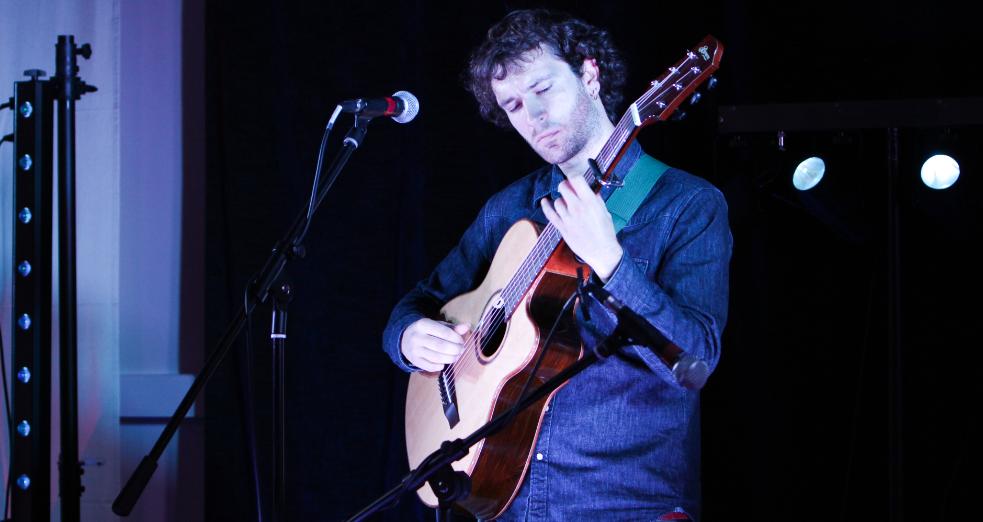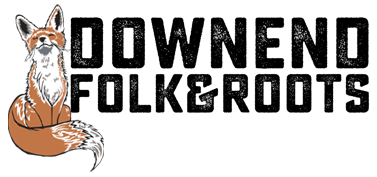There’s always a near enough full house at Downend Folk Club, and the recent EWAN McLENNAN gig was no exception, as the friendly and convivial confines of Frenchay Village Hall were populated with a crowd of regulars, returning punters and newcomers. It is refreshing, in these straightened times, to see such a good crowd coming in regularly, supporting their local venue, and showing interest in the club, its performers and the music in general.
And the audience were treated to two performers, who, in different ways, summed up what folk music is all about.
MC Steve Johnson, deputising for a Folk Expo-ing Ant Miles, stood in with good grace and good humour. His presence is but one example of the professionalism and dedication of the club and its organisers, who look after all of the facilities of the venue – the raffle, the bar etc, and help maintain the homely, comfortable, but reverential atmosphere that the club is becoming rightly known for.
First up on the night was NIBS VAN DER SPUY, a South African singer and songwriter on a short tour of the UK. He enthralled and entertained the crowd with deceptively ‘simple’, honest, homely songs, accompanying himself with guitars of various shapes, and harmonica. With both vivid and immediate imagery, Nibs delivered quiet stories, exquisitely told. His delivery is comforting, his voice welcoming and his songs an interesting blend of influences (from the Beatles, via his British grandmother, to the indigenous music of Kwazula Natal). Songs like 'Shaded In Blue' and 'Anna Rosa', and tunes like 'Brunette On A Bicycle' were delivered on what looked like a solid-bodied, electro-acoustic guitar, before Nibs turned to a Puerto Rican 10 string Quattro guitar. 'Once I Climbed A Lion Mountain' shows how he is able to bring his local settings and experiences to a wider audience. Very much more than a support act, Nibs Van Der Spuy has the songs, the presence and the performance to turn his hand to many things.
After a break for parish announcements and recharged glasses, Ewan McLennan took to the stage. Immediately capturing the audience with his straightforward, make-it-look-easy delivery, McLennan put me in mind of both the guitar excellence of Martin Simpson and, vocally at least, Dick Gaughan, especially in settings of songs like Burns’ 'A Man’s A Man For A’ That'.

Photo: Julian Cox
From the overture and opening of the set, through songs in both Scots and English, he displayed both the humour and humility needed to attain the complete package of a folk singer that he is rapidly becoming. Real, unaffected, and once again, honest, I found myself nodding away, agreeing with him and his songs.
And of those songs, whether they be traveller songs from the north east of Scotland, or Ewan’s own, they often touch on the travelling life, both of home and far away. Performances like 'The Coat O’ Gold' remind you of the truth and power of folk music, with McLennan delivering classic Scottish music with a modern twist. He’s a performer who knows what he is doing and does it better than many – the Downend audience was kept in quiet rapture throughout his set.
'Lampeduza' was faultless and heartbreaking, showing that songs of migration can never be consigned to history, whilst Ewan reached for his banjo on 'The Miles I’ve Travelled'.
Into the second half, we were treated to the real life descriptions of 'Down The Line' and Alistair Hewlett’s 'The Granite Cage' and its description of the Red Clydeside period of 1915-1919. It’s obvious that Ewan is interested in stories of justice & representation, evidenced by the anti-war feelings of Ian Campbell’s Old Man’s Tale, Arthur McBride and the fascinating Blacken The Engines, which recounts a workers revolt in the East Kilbride Rolls Royce factory and its links to the 1973 Chilean coup.
In fact Chile turned up again, with 'Whistling The Esperanza'’s stirring tribute to the Chilean miners further illustrating Ewan’s ability to turn stories into songs. With an encore of I’m A Man You Don’t Meet Everyday, Ewan rounded out his performance of honesty, truth, emotion and understanding – and how can you sum up folk music better than that?
- Gideon Thomas, Committee Member
